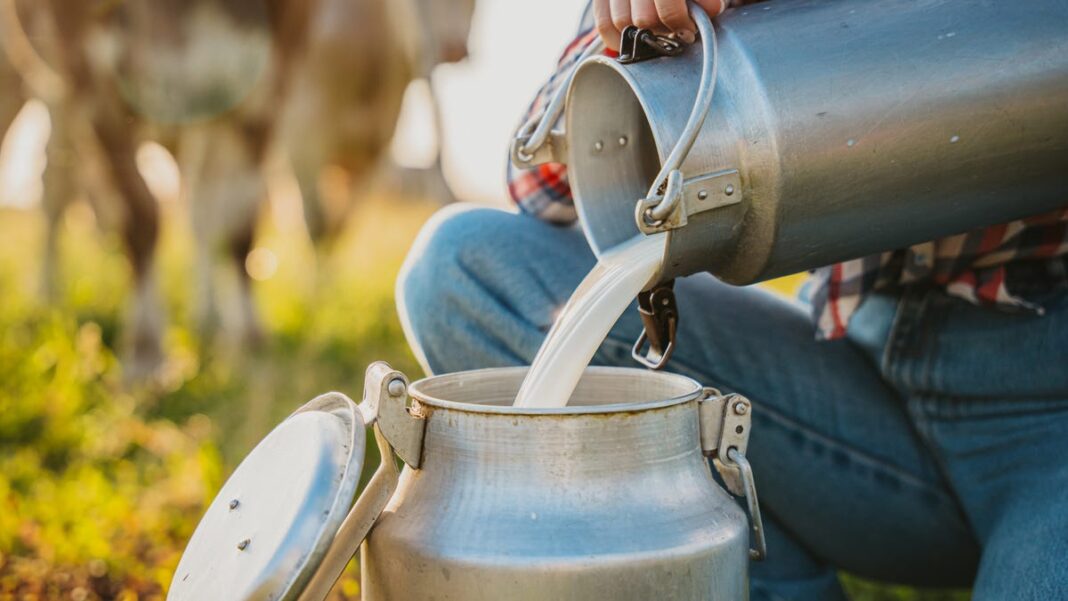The USDA is examining raw milk for avian flu. Is it safe to consume?
The U.S. Department of Agriculture (USDA) has announced plans to test large batches of raw milk nationwide for the avian flu, which has spread rapidly among cattle in California this year.
During a press briefing on May 1, the CDC, FDA, and USDA reported that testing of commercial dairy products found traces of the H5N1 bird flu virus in 20% of the samples. However, none contained the live virus that can cause illness in humans, and officials confirmed that pasteurization effectively eliminates the bird flu virus, ensuring the milk is safe to drink.
The rising popularity of raw dairy, which had already been a concern prior to the avian flu outbreak, prompted the CDC to release further warnings in May. They stated that “high levels of A(H5N1) virus have been found in unpasteurized (‘raw’) milk” and advised against consuming raw milk or products made from it.
Raw milk refers to milk that has not been pasteurized, a crucial food safety procedure that uses heat to destroy harmful microorganisms, including H5N1, says Meghan Davis, DVM, MPH, PhD, an associate professor at the Johns Hopkins Bloomberg School of Public Health.
Experts in diet and food safety emphasize that the potential health risks and similar nutritional benefits of raw and pasteurized milk make pasteurization the clear choice. Here’s what they want you to understand about the safety concerns surrounding raw milk.
Is raw milk safe to drink?
Indeed, consuming raw milk can endanger the health of others, even if they haven’t consumed it, as Davis points out. Individuals with weakened immune systems, such as toddlers, pregnant women, the elderly, and young children, face a heightened risk of illness.
Advocates for raw milk often claim that pasteurization reduces its nutritional value, but registered dietitian Jamie Nadeau counters that is not the case. “When you evaluate the advantages and disadvantages, it simply doesn’t make sense to prefer raw milk,” she tells YSL News.
The main drawback of raw milk is that it can harbor harmful pathogens responsible for serious, life-threatening diseases such as Guillain-Barré syndrome and hemolytic uremic syndrome, according to Nadeau. Even if you’ve consumed raw milk before without falling ill, there’s no way to guarantee you will remain healthy after future consumption.
“Unfortunately, there’s no certainty that raw milk is safe, even if sourced from a familiar farm,” Nadeau explains. “You may get sick from raw milk from a brand you’ve previously consumed without issues. Regardless of the health of the cows or the quality of the farm, illness can still occur.”
Is raw milk more nutritious?
Some individuals believe raw milk is healthier because it’s seen as “less processed,” but Nadeau disputes this idea.
“The nutritional changes that occur during pasteurization are minimal,” she states. “Pasteurized milk holds the same nutritional value as raw milk while being significantly safer.”
If you’re looking for less processed milk, Davis recommends opting for commercially pasteurized but non-homogenized milk, often referred to as cream-top. “This type has undergone essential food safety processes involving heat and pressure but not additional processing steps,” she explains.
There are also misconceptions about the health benefits of the bacteria in raw milk; Nadeau suggests those ideas are overstated. For gut health, she recommends foods such as yogurt, kefir, kombucha, or probiotic supplements instead.

